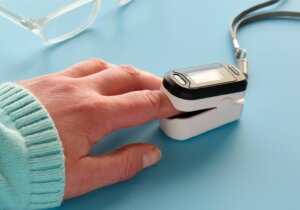
What Asthma Taught Me About Anxiety
Growing up, my parents and I never realized I had asthma. I would get an occasional tight, itchy chest after playing outside, but I never felt very short of breath. “Allergies,” my family would say. And there was comfort in that assessment. As a young girl prone to anxiety, in particular health anxiety, assurance that I had nothing to worry about was always foremost in my mind.
Fast forward to adulthood, when in 2019, after a week-long antibiotic-induced gastroesophageal reflux disease (GERD) episode, I was finally diagnosed with asthma. The medical staff prescribed heartburn medication, methylprednisolone (a strong oral steroid), and inhalers, then sent me home with the reassurance that it would all settle down soon.
It didn’t.
What happened over the following several months taught me a lot about fear, resilience, self-advocacy, and how important having a top-notch asthma and allergy specialist really is.
Along with the asthma diagnosis in 2019, I was diagnosed with complex post-traumatic stress disorder (C-PTSD), meaning it has many contributing factors over a long period of time. I’d had it for decades, but never gave “it” a name. I had experienced many of C-PTSD’s textbook symptoms for as long as I could remember. They were issues I learned to cope with and compensate for, as many of us do with various struggles in life. (Trigger warning) One of the many contributing factors to my C-PTSD was having had an abusive ex in my college years smother me repeatedly with a pillow.
It goes without saying that breathing, freely and without restriction, is indescribably important to all of us. And when you’ve been abused like I had, it was impossible to forget the sheer terror of feeling that breath slip away. When you have asthma, you know that feeling too. And you’ll do just about anything to avoid experiencing the anguish again.
 Which brings me back to my asthma diagnosis. The medicines they gave me worked, but only somewhat. I was finding myself in the urgent care clinics several times a week. With looks of sympathy and words of reassurance, the medical teams did the best they could to help me believe that this common ailment was under my control as long as I was medicated. Weeks stretched into months. I became obsessed with checking my oxygen levels several times a day. I talked to at least one after-hours physician per week. I was in almost constant fight-or-flight mode, all the while trying to put up a calm front for my youngest son. Here I was, the lady in charge, special needs homeschooling, head of household management, partner to my husband, you name it . . . but I could barely get through my day without a Xanax.
Which brings me back to my asthma diagnosis. The medicines they gave me worked, but only somewhat. I was finding myself in the urgent care clinics several times a week. With looks of sympathy and words of reassurance, the medical teams did the best they could to help me believe that this common ailment was under my control as long as I was medicated. Weeks stretched into months. I became obsessed with checking my oxygen levels several times a day. I talked to at least one after-hours physician per week. I was in almost constant fight-or-flight mode, all the while trying to put up a calm front for my youngest son. Here I was, the lady in charge, special needs homeschooling, head of household management, partner to my husband, you name it . . . but I could barely get through my day without a Xanax.
Why wasn’t I like all of the other people with asthma I knew? My upbeat energetic neighbor? My child’s favorite therapist? The checker at the grocery store? All with asthma. But all of them with it seemingly “under control.” Living their lives. Not running to clinics constantly. And from what I could tell, not living in daily fear.
Then one day, my regular asthma and allergy physician, a nice guy who was very by the book, was out of the office. I was scheduled instead with his partner. Now this physician, he was different . . . he was a breath of fresh air, pun intended. His motto was: think outside the box, do whatever works and test, test, test until you find all of the contributing factors to your asthma. Plus, he thought it was a shame my abusive ex hadn’t gotten run over by a truck, which he followed up with by saying “nothing is scarier than when you can’t breathe and with C-PTSD you’re constantly being triggered.” I had been waiting for a physician treating my asthma, any of them, to say those words. To finally get it. I cried through our whole first appointment.
Keeping his promise, my new asthma specialist sent me to several other specialists for testing.
 I learned that I also have vocal chord dysfunction, an evil asthma mimic that affects my upper airways and throat. We also discovered I have a rare condition called jackhammer esophagus which contributed to my GERD. GERD is extremely hard on your lungs. Coupled with my severe allergies, I had basically the perfect breathing disorder storm.
I learned that I also have vocal chord dysfunction, an evil asthma mimic that affects my upper airways and throat. We also discovered I have a rare condition called jackhammer esophagus which contributed to my GERD. GERD is extremely hard on your lungs. Coupled with my severe allergies, I had basically the perfect breathing disorder storm.
Some medications we tried were failures, others gave me back a semblance of the control I desperately craved. My physician had all kinds of unique delivery methods he was famous for, too. (Have you ever taken your puffer medication through a baby bottle nipple in your nose? Who knew?) He wouldn’t give up until I got better. In retrospect I think it was partly because he cared about me, and partly because he wasn’t used to failure and refused to accept it. At various points I’m sure I drove him and his staff crazy with my seeking comfort and encouragement. But gradually, and without me noticing it was happening at first, I realized I’d gone days without talking to him. Days without panicking. I daresay even a full 24 hours without checking my oxygen. The medicines were working.
So, I started to take my son outside to play. And I mean really play.
I wasn’t acting anymore. I actually felt relaxed. I could focus again, on life beyond just basic body vitals. I trusted my lungs to keep bringing in the fresh outdoor air. I trusted myself to take care of any symptoms as they arose, but without dreading that they inevitably would rise. I learned that I had control. My body was not attacking me. No one was attacking me. Ever again.
My advice in dealing with your own health challenges is this: Remember that the path to health may often seem convoluted and exhausting, but don’t give up. Keep advocating for yourself. It’s okay to question the answers. And remember how brave you are.
Dedicated to George Floyd, who couldn’t breathe.
Do stress and anxiety affect your asthma? Learn more.
Control your anxiety to help manage your asthma. Learn more.
Respiratory therapists share their thoughts on asthma and anxiety. Learn more.
Vocal cord dysfunction (VCD) or paradoxical vocal fold movement (PVFM). Learn more.
Jackhammer esophagus – a motility disorder of the esophagus. Learn more.
Do you experience allergy-induced asthma, with or without additional medical conditions? PlasmaLab in Everett WA is seeking candidates for our Allergy Antibody Plasma Donation Program to support allergic asthma diagnostics and medical research.

Melonie McCoy, Freelance Writer
I write about attached parenting, LGBTQ families, asthma awareness, and Scotland whenever possible, as they are all dear to my heart. I’m launching Highland Lass Copywriting soon and hope someday to visit the land of my obsession.
Thank you, Mel McCoy, for sharing your brave story about asthma and anxiety.
